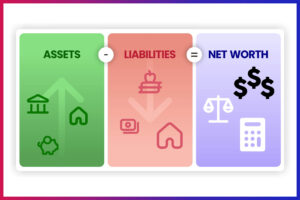Ever wondered why knowing your net worth matters in business? It’s more than just a number—it’s your financial compass. Calculating net worth isn’t just about summing up assets and liabilities; it’s the key to understanding your financial health, making smarter decisions, and setting the course for success.
When we talk about the net worth of an individual or company, we refer to the value of the assets a person or corporation owns, deducting the liabilities they owe. It is a standard or basis to gauge a company’s health, providing a valuable snapshot of its current financial position. Net worth relates to people or organisations in terms of quantity. It computes the value of an entity and can apply to individuals, corporations, sectors, and even countries. Net worth provides an overview of an entity’s current financial position. People with significant net worth are called high-net-worth individuals (HNWI). Currently, Elon Musk currently has the highest net worth on the planet.

Net Worth & Its Significance
- Net worth is categorised into positive or negative. Positive net worth means that assets surpass liabilities. Likewise, negative net worth means that liabilities exceed assets. Net worth is not just about individuals; you can apply it to companies, sectors, and countries. Positive and increasing net worth stipulate good financial health.
- A high net worth indicates well-off financial strength and eventually provides a good credit rating for an individual or a company. In the same way, a decreasing or negative net worth signals a weaker financial strength and a lower credit rating, which impacts the individual’s or the company’s capability to raise funds from the market. Net worth is a tool to be aware of one’s financial value.
- Net worth is also known as book value or shareholders’ equity when talked about in the net worth in business terms. The balance sheet is also known as the net worth statement.
- The difference between the value of total assets and liabilities is the value of a company’s valuation. It is essential to remember that the values on a company’s balance sheet highlight historical costs or book values and not the current market values.
- A company that has been noticing consistent profits will note a rising net worth or book value if the shareholders don’t have these profits as dividends. Concerning a publicly traded company, the increased book value corresponds with a rising stock price.
- To calculate the net worth of a particular person. First, you must have complete information about your assets and liabilities. Information regarding your assets and liabilities are the determining factors in your net worth.
- First and foremost, you will need to list all your assets, including the value of your home, any real estate property, vehicles like cars, and the value of your business (if you are a businessperson). Then, you need to list all your liquid assets, which are the assets that can be easily, securely and quickly exchanged for legal tender. The liquid assets include cash in hand, cash in the bank, cash equivalents, accrued income, promissory notes, government bonds, stocks, marketable securities, accounts receivable, certificates of deposit, and tax refunds. Now, add all your assets.
- After calculating your assets, start listing all your liabilities, which include the balance on your mortgage or car loans. List these loans with their current balances and all your liabilities like credit cards, education loans, or any other debt you may owe.
- The next step is to add all liabilities that you have listed. It represents total liabilities.
- Now, just put your values to the net worth formula, irrespective of how big or small the number is. The positive or negative number will now represent your total net worth.
- You can repeat this process once a year and compare it with the previous year’s number to find whether you are making profits or getting behind on your goals.
Why Should Net Worth be Calculated?

It is important to calculate your net worth as all of you have your own long-term or short-term financial goals which you wish to fulfil, like owning a home, paying for children’s education fees, retirement, financial independence, and more.
You can achieve these financial goals only when there is an increase in your net worth. Additionally, you will know you are on the right track if the net worth calculation is rising each year. However, if it is falling or staying the same. You can understand and analyse the causes and work towards improving your financial situation.
The Final Words
To put it simply, knowing and periodically evaluating your net worth is a roadmap to realizing your goals and safeguarding your financial future. It serves as the compass on your path to growth and financial security.
Individuals and businesses can better grasp their financial situation by adopting the practice of measuring net worth. It’s not just about calculating the current worth; it’s also about the direction it points toward future goals and aspirations.
Remember that your net worth serves as a starting point—a benchmark from which you may plan, adjust, and construct a more substantial financial portfolio—regardless of the number it displays. Periodically recalculating your net worth acts as a compass to make sure that every move you take is in line with your final financial goal.
So, take the charge today. Start calculating your net worth, focus on your financial goals, and let your net worth be more than just a figure—let it be the engine driving you toward prosperity and financial security.
Must Read:
- The Success Story Of Gautam Adani -Ambitions Turn To Reality
- Savitri Jindal: The Leading Lady Behind The Legendary Jindal Group
- Top Six Social Media Marketing Tips For Small Businesses
- Giving CFOs more power in the marketing ecosystem
- How small businesses can benefit from Integrated Marketing Strategies




